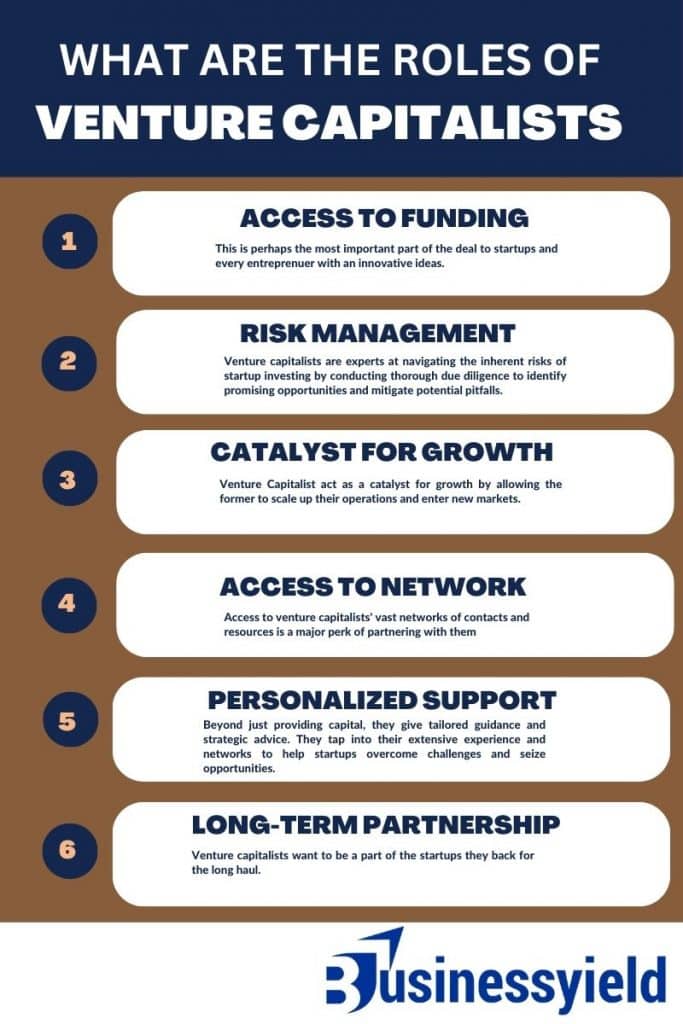As someone who has been through the ups and downs of starting and growing a business, I know firsthand the role venture capitalists (VCs) play in entrepreneurial success and startup businesses. Anyone can have a disruptive idea, fueled by passion and the drive to change the world. You can be standing on the precipice of innovation, but without the necessary resources—I mean funding—your dream may remain just that—a dream.
If you’re in this situation, you should turn to venture capitalists, especially if you’re a start-up. I’ve had the privilege of engaging with VCs firsthand, pitching my vision, and witnessing their discerning eyes light up with excitement. This isn’t something I’ve read about in textbooks or heard about in lectures; it’s something I’ve experienced. I’m an entrepreneur who understands the highs and lows of seeking finance. This personal understanding motivates me to share my insights with you today on understanding the role of venture capitalists in business. So, join me as I reveal the lessons learned, wisdom gained, and untold stories that lay under the surface. This is not just another article; it’s a firsthand narrative based on passion, determination, and a profound commitment to greatness.
KeyPoints
- A venture capitalist (VC) is a person or organization that offers financial backing to new and growing businesses in return for a portion of the company’s ownership, that is, equity.
- VCs specialize in identifying and backing startup companies with sky-high growth potential.
- Some of the primary roles of venture capitalists for businesses include access to funding, risk management, catalysts for growth, access to networks, personalized support, and long-term partnerships.
- The venture capital investment process involves idea generation, testing, pitching to VCs, due diligence, and negotiation.
- Airbnb, Uber, Facebook, Tesla, and so on are examples of some renowned companies that received venture capital at startup
- To qualify as a venture capitalist, you must have the financial resources, investment experience, industry specialty, networking skills, risk tolerance, strategic vision, legal knowledge, and some certification or licensing.
- Venture capitalists get paid in two ways. The first is a management fee for handling the company’s capital. This is mostly about 1 to 2 percent of the capital. The second is carried interest on the fund’s return on investment, commonly known as the “carry.”
- The four key players in the venture capital industry are the entrepreneurs, the investors, the investment bankers, and the venture capitalists.
What is a Venture Capitalist?
A venture capitalist (VC) is a person or organization that offers financial backing to new and growing businesses in return for a portion of the company’s ownership, that is, equity. Venture capitalists typically invest in early-stage or emerging companies that demonstrate promising innovation, scalability, and market potential.
I’ll say it isn’t merely a financial support scheme; it’s a symbiotic partnership between visionary entrepreneurs and seasoned investors. It’s about more than just injecting capital into fledgling startups—it’s about nurturing and empowering the next generation of innovators.
What Do Venture Capitalists Do?
VCs specialize in identifying and backing startup companies with sky-high growth potential. They are armed with a keen eye for innovation and a knack for spotting untapped markets. We can simply say they scour the entrepreneurial landscape in search of diamonds in the rough.
Again, venture capitalists aren’t just passive financiers; they are part and parcel of the business. First, they roll up their sleeves, dive headfirst into the trenches, and also provide invaluable guidance and mentorship every step of the way. Secondly, they refine business models and forge strategic partnerships. For start-up businesses in need of funds and mentorship, I can say that venture capitalists are partners in your journey to success.
Why Do Venture Capitalists Matter?
I’ll say it’s because it empowers dreamers to defy the odds, disrupt industries, and shape the future. To put it more simply, venture capitalists are the lifeblood of innovation, the fuel that propels groundbreaking ideas from the drawing board to the global stage—the link between dreams, idea execution, and reality.
Roles of Venture Capitalist to Business

Having been deeply involved in the startup scene for years, I’ve gained invaluable insights into the pivotal role that venture capitalists (VCs) play in driving innovation and fostering growth. Based on my firsthand experience, the following are some of the multifaceted roles of VCs:
#1. Access to Funding
This is perhaps the most important part of the deal for startups and every entrepreneur with innovative ideas. Interestingly, other benefits aside from this play vital roles in ensuring the success of your entire plan. The funds are released in exchange for equity, don’t mistake venture capitalists for angel investors. Both are distinct ways of raising funds for your business operation.
#2. Risk Management
Venture capitalists are experts at navigating the inherent risks of startup investing. They conduct thorough due diligence to identify promising opportunities and mitigate potential pitfalls. I’ve witnessed how VCs carefully assess each investment opportunity, weighing the potential risks and rewards to make informed decisions. They don’t just fund your ideas, they also help you manage the risk involved in executing your ideas.
#3. Catalyst for Growth
When startups approach venture capitalists for funding, the latter act as a catalyst for growth by allowing the former to scale up their operations and enter new markets. I have witnessed firsthand how their investments have catapulted businesses into the stratosphere, where they are now leading the charge for economic growth and innovation.
#4. Access to Networks
Access to venture capitalists’ vast networks of contacts and resources is a major perk of partnering with them. A VC’s network can open doors that would otherwise be inaccessible. These are possible clients, business associates, or even industry heavyweights. I’ve personally leveraged these networks to forge valuable connections and collaborations that have propelled my startup forward.
#5. Personalized Support
As a founder myself, I’ve directly benefited from the personalized support and mentorship that VCs offer. I can boldly say that beyond just providing capital, they give tailored guidance and strategic advice. They tap into their extensive experience and networks to help startups overcome challenges and seize opportunities.
#6. Long-Term Partnership
Above all else, venture capitalists want to be a part of the startups they back for the long haul. As their portfolio firms face the inevitable ups and downs of rapid expansion, they are there to provide unwavering support and invaluable advice. Having a reliable companion is invaluable. I have learned this from my personal experiences, particularly while embarking on the uncertain path of entrepreneurship.
Venture Capital Advantages and Disadvantages
Although venture capital can be a saving grace for companies that need finance and guidance, startups should consider how it will positively and negatively affect their firm over time. Below are some of the advantages and disadvantages of venture capital:
Advantages
#1. Access to Funding
Unless you’re fortunate enough to win a grant or blessed with angel investing, venture capital may be your easy route to raising funds for your start-up business. Most often, traditional financing options are limited for startups.
#2. Networking Opportunities
VC firms mostly have extensive networks within the business community. These include potential partners, customers, and other investors that startups can leverage to accelerate their growth and expansion.
#3. Expertise and Guidance
I think the expertise and guidance that VC offers are as good as the financial backing. Like a good mentor, they offer extensive knowledge of the sector, contacts within the field, and advice on long-term strategy. Startups might benefit from this by overcoming obstacles and scaling up their operations.
#4. Validation
The ability of a startup to attract investment from well-respected venture capitalists is an indication of the strength of the company’s concept, leadership, and prospects. This might be especially useful when looking for more collaborations or funding.
Disadvantages of Venture Capital
#1. Loss of Control
It is common practice for businesses to cede some degree of control and ownership when they accept venture capital. Future disagreements about the company’s overall direction can arise if venture capitalists have a vote in key matters.
#2. Focus on Exit Strategies
Not everyone knows this, but the truth is, that venture capitalists usually emphasize “exits,” or ways out. Don’t get it twisted, these are simply exit strategies to get their money out, such as acquisitions or IPOs. Of course, this is the last thing on a startup’s mind.
#3. High Expectations
Investors in venture capital companies often anticipate a high rate of return on their money within a short time. Most often, this is between five and seven years. For entrepreneurs, the pressure to achieve quick growth and profitability could be overwhelming, and it could cause them to make unsafe decisions.
#4. Dilution
In the process of raising capital, founders and early workers, among other current shareholders, may see their ownership position in a firm being eroded. What this means is that their stake in the company will gradually shrink as time goes on.
Before we fully dive into this, there’s the pre-preparation process, which includes the idea-generation process and the making of a prototype. This means you have already tested the validity of your idea, with in-depth knowledge of its impact on the market as well as customer responses to it. Once you’re armed with this and understand it, it’s time to find potential investors and proceed to the following:
#1. Pitching to VCs
From my own experience, I’ve learned that effective pitching requires more than just a polished slide deck. Pitching is where you get to capture the imagination of investors, by conveying the unique value proposition of your startup in a way that resonates deeply.
Imagine standing in a room filled with venture capitalists, armed with nothing but your passion and a compelling business idea. Regardless of how anxious you are, you’ve got to get on with it. I can boldly say that pitching is where the journey begins.
When it comes to pitching, bear in mind that venture capitalists are looking for bold ideas, market opportunities, and a team with the grit and determination to execute their vision. They want to see not just potential, but tangible evidence of traction and market validation. Generally speaking, pitching determines the fate of your startup with venture capitalists.
#2. Due Diligence
Once you’ve piqued the interest of a venture capitalist, the real work begins. Due diligence is a rigorous process that involves a deep dive into every aspect of your business—from financials and operations to market positioning and the competitive landscape.
From my personal experience, I can boldly say that this phase can be both exhilarating and nerve-wracking. However, it’s an opportunity to showcase the strengths of your startup while also being prepared to address any concerns or weaknesses that may arise.
From my personal experience, two things will help out here. These are transparency and authenticity, both of which are crucial during due diligence. Every venture capitalist appreciates honesty and openness, and being forthcoming with information can help build trust and credibility throughout the process. Therefore, arming yourself with these will be of immense help to you.
#3. Negotiations
You weren’t expecting these guys to release funds to you because you piqued an amazing pitch. Oops, it doesn’t work that way, there’ll be negotiations. Negotiating the terms of a venture capital investment is a delicate dance that requires finesse, strategy, and a keen understanding of both parties’ needs and objectives.
I learned an important lesson from my negotiations with venture capitalists, which is to “advocate your interests with the willingness to compromise when necessary.“
Generally, this is about finding common ground and reaching a mutually beneficial agreement that sets the stage for a successful partnership, that’s all.
I must warn you, though, to always approach negotiations with confidence and preparedness, in line with a clear understanding of your startup’s value proposition, market potential, and growth trajectory. With these in place, you’ll strike a chord in the heart of the venture capitalist panelist.
What Do Venture Capitalists Look Out For?
Drawing from my firsthand experience and insights, the following are the key things that venture capitalists look out for:
#1. Game-changing Ideas
Having benefited from venture capital funding myself, I’ve come to realize that venture capitalists are looking for startups with game-changing ideas, market traction, and a stellar team. Every one of them wants to invest in entrepreneurs who not only have a compelling vision but also the tenacity and expertise to bring that vision to life.
#2. Traction Speaks Volumes
Aside from having a game-changing idea, venture capitalists want to see evidence that your startup is gaining traction with customers and achieving meaningful milestones.
#3. Scalability is Key
VCs are looking for startups that have the potential to scale rapidly and disrupt industries on a massive scale. Trust me, no one wants to be involved in a failed project.
Ultimately, venture capitalists invest in people as much as they invest in ideas. They want to partner with entrepreneurs who are passionate, resilient, and driven to succeed.
Business Yield’s Venture Capitalist Funding Checklist for Entrepreneurs
Download Business Yield’s Venture Capitalist Funding Checklist for Entrepreneurs
Real-world Examples of Successful Startups that Have Received Venture Capital Funding and Gone on to Achieve Significant Growth
Below are some real-world examples of successful startups that received venture capital funding and experienced significant growth.
#1. Airbnb
Airbnb, the popular online marketplace for lodging and vacation rentals, raised its first round of venture capital funding in 2009. The company secured $600,000 in seed funding from Sequoia Capital and Greylock Partners. With this support, Airbnb experienced explosive growth, transforming from a small startup into a global hospitality giant. By 2011, the company had raised additional funding rounds totaling over $100 million and expanded its presence to over 190 countries worldwide.
Venture capitalists played a crucial role in Airbnb’s success by providing not just financial capital but also strategic guidance and mentorship. Sequoia Capital, in particular, played a pivotal role in shaping Airbnb’s growth strategy and connecting the company with key industry players. The VC firm’s deep expertise in the technology and hospitality sectors helped Airbnb navigate challenges and capitalize on emerging opportunities, ultimately propelling the company to become one of the most valuable startups in the world.
#2. Uber
Uber, the ride-hailing and food delivery giant, raised its first round of venture capital funding in 2011. The company secured $11 million in Series A funding from Benchmark Capital and $32 million in Series B funding from Menlo Ventures, among others.
With this strategic relationship, Uber experienced rapid expansion, disrupting the transportation industry on a global scale. By 2014, the company had raised additional funding rounds totaling over $1.5 billion and expanded its operations to hundreds of cities worldwide. Today, Uber is valued at tens of billions of dollars and operates in over 900 metropolitan areas.
Benchmark Capital played a key role in shaping Uber’s early trajectory, helping the company navigate regulatory challenges and expand into new markets. The VC firm’s expertise in the technology and transportation sectors was instrumental in positioning Uber as a global leader in the sharing economy.
Others Include
- Tesla
- Apple and so on
What Qualifies you as a Venture Capitalist?
To qualify as a venture capitalist, you must have the financial resources, investment experience, industry specialty, networking skills, risk tolerance, strategic vision, legal knowledge, and some certification or licensing.
How Do Venture Capitalists Get Paid?
Venture capitalists get paid in two ways. The first is a management fee for handling the company’s capital. This is mostly about 1 to 2 percent of the capital. The second is carried interest on the fund’s return on investment, commonly known as the “carry.”
Can a Single Person be a Venture Capitalist?
Yes, a single person can indeed act as a venture capitalist, although it’s more common for venture capital to be practiced by firms or groups of individuals pooling their resources. Can you be a venture capitalist without money?
Key Players in the Venture Capitalist Industry
According to Forbes, four key players make up the venture capital industry. These are the entrepreneur or innovator, the investors, the investment bankers, and the venture capitalists.
#1. Entrepreneurs or Innovators
This is the startup that engineered amazing ideas. This group of people is driven by an unwavering desire to bring their visions to life. However, to make their aspirations a reality, they require assistance—namely, financing.
#2. Investors
The second players are the financial risk-takers, who are willing to venture into the unknown in search of possibly large profits. They understand the risks, yet they are motivated by the thrill of the chase and the prospect of huge gains. They are the backbone of the venture capital ecosystem because they are always willing to make enormous bets on the next great thing.
#3. Investment Bankers
Investment bankers are the drivers of opportunity or architects of trade. They are experts deal-makers, leading businesses through the complexities of mergers, acquisitions, and public offerings. They create the path for businesses to shine on the great stage of the market by having a keen eye for value and the ability to negotiate.
#4. Venture Capitalists
Venture capitalists are the link between ideas and reality. They are the ones who convert ideas into investments, and investments into successful stories. They simply create markets where entrepreneurs, investors, and bankers may meet; they fuel growth, inspire innovation, and change the future.
Stages in Venture Capital
According to startupgeek.com, there are 6 stages in venture capital funding; these are as follows:
#1. Pre-Seed Stage or The Genesis Phase
Think of this as the moment when the spark of an idea ignites into something tangible. These breathtaking ideas are transformed into prototypes. Armed with the prototype design, these innovators begin their quest for someone willing to fund their dream.
#2. Seed Stage
As the seeds of their idea begin to take root, things start to get exciting, because they have found like-minded people willing to invest in their dreams. Here, the funding received is poured into nurturing the seedling—conducting market research, fine-tuning strategies, and assembling a dream team to bring their vision to life.
#3. The Series A
With a solid foundation in place, our intrepid entrepreneurs set their sights on the next frontier: securing the backing of venture capitalists. Armed with a compelling pitch and a roadmap for success, they embark on a journey marked by relentless innovation, customer acquisition, and the sweet taste of early victories.
#4. The Series B
As success beckons, it’s time to kick things up a notch. This stage is all about turbocharging growth—ramping up production, expanding marketing efforts, and scaling operations to new heights. With their eyes firmly set on the prize, they seek out a substantial injection of capital to fuel their ambitious plans.
#5. Series C And Beyond or The Expansion Odyssey
With each milestone surpassed, our heroes venture further into uncharted territory. Series C funding and beyond mark a period of boundless growth and exploration, as the company sets its sights on conquering new markets, pioneering groundbreaking products, and perhaps even acquiring rival startups along the way.
#6. The Mezzanine Marvel
And finally, as our intrepid entrepreneurs stand on the brink of greatness, they turn to mezzanine financing as their trusty steed. This hybrid of debt and equity serves as the bridge to their ultimate destination—an IPO and beyond, where the possibilities are as limitless as their imagination.
List of Some Venture Capitalist Firms
In no particular order, the following are some of the renowned venture capitalist firms in the United States:
- Sequoia Capital
- New Enterprise Associates
- Andreessen Horowitz
- GGV Capital
- Accel
- Kleiner Perkins
- Bessemer Venture Partners
- Intel Capital
- Khosla Ventures
- Index Ventures
Conclusion
Venture capital isn’t just an investment—it’s a catalyst for change, a beacon of hope for aspiring entrepreneurs, and a testament to the power of collaboration. As someone who’s experienced the highs and lows of the entrepreneurial rollercoaster firsthand, I can attest to the transformative impact venture capitalists have on startups. So here’s to the trailblazers, the risk-takers, and the visionaries who dare to dream—and to the venture capitalists who believe in them every step of the way, cheers.
- BUSINESS VENTURE: Definition, Examples & How to Start One
- 10 Positioning Statement Examples That Drive Customer Loyalty






